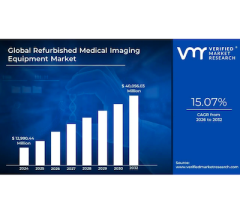
GE HealthCare and Mass General Brigham have announced the co-development of an artificial intelligence (AI) algorithm that will help increase operations effectiveness and productivity. As part of its initial collaboration, the first AI application is the Radiology Operations Module (ROM) to help optimize scheduling, reduce cost, and free providers from administrative burden. Image courtesy: Mass Gen Brigham
September 6, 2023 — GE HealthCare and Mass General Brigham have announced, as part of its initial collaboration, the co-development of an artificial intelligence (AI) algorithm that will help increase operations effectiveness and productivity. The first innovative AI application from the collaboration is the schedule predictions dashboard of Radiology Operations Module (ROM), a digital imaging tool that helps optimize scheduling, reduce cost, and free providers from administrative burden, allowing more time for the clinician-patient relationship, according to a statement issued today by GE HealthCare, which added that ROM is commercially available to healthcare institutions.
“Utilizing operational AI and machine learning can bring providers together and streamline data sets,” said Keith Dreyer, DO, PhD, Chief Data Science Officer, Mass General Brigham. “The strategic use of AI offers great potential for the future of healthcare and we’re proud to be at the forefront of the movement. This technology has the potential to reduce burnout and allow physicians to spend more time with patients, which may ultimately lead to better outcomes," added Dreyer, who is an Associate Professor of Radiology at Harvard Medical School, Dreyer head of the MGH & BWH Center for Clinical Data Science (CCDS).
"Amid the vast sea of data and the heavy tasks that divert healthcare providers from patient care, our collaboration with Mass General Brigham is groundbreaking,” said Parminder Bhatia, Chief AI Officer of GE HealthCare. Through the fusion of distinctive datasets and cutting-edge machine learning methods, harnessing the synergy of clinical and technical proficiency, we are ushering in unprecedented healthcare advancements,” Bhatia added.
The actionable insights driven by AI and machine learning are designed to help improve both departmental and enterprise-wide productivity and administrative efficiency. The statement referenced a report conducted by analytic firm Mercer noting that, by 2025, the U.S. is estimated to have a shortage of approximately 446,000 home health aides, 95,000 nursing assistants, 98,700 medical, and lab technologists and technicians, and more than 29,000 nurse practitioners. As such, it stated, health systems will need to rely on technology to help solve some of these challenges.
Notably, operational AI-enabled tools can address challenges that often pose a threat to patient care such as cost of care, and hospital inefficiencies. When a patient misses an appointment, fails to schedule a follow up or is late, also known as missed care opportunities (MCO), the impact can be significant, reported the company. It further added that the co-developed algorithm is intended to predict MCO and late arrivals, which could help increase flexibility and streamline administrative operations, improve patient satisfaction, and better accommodate urgent, inpatients, or walk in appointments. In preliminary tests, the company statement reported that the algorithm was able to predict the missed care opportunity correctly, at rates of up to 96%, with limited false positives.
The 10-year commitment to drive innovation between GE HealthCare and Mass General Brigham was first signed in 2017 to explore the use of AI across a broad range of diagnostic and treatment paradigms.
More information: www.gehealthcare.com


 February 06, 2026
February 06, 2026 









